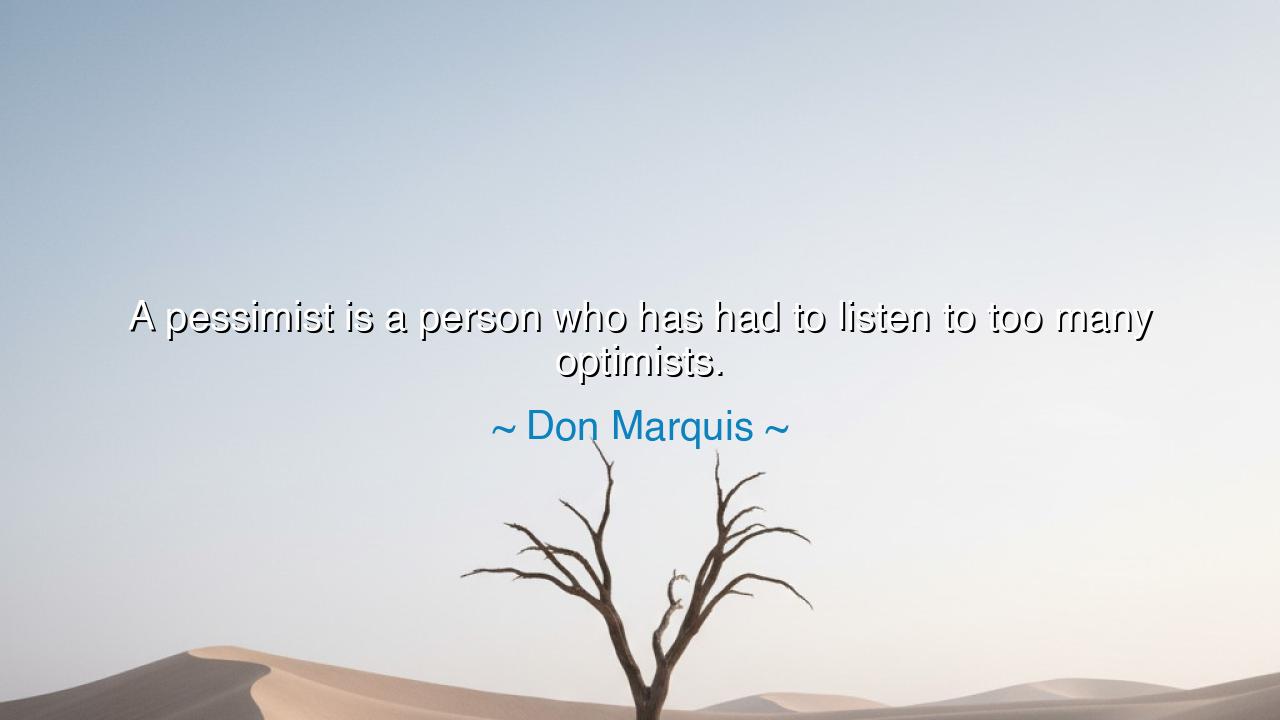
A pessimist is a person who has had to listen to too many






In the age when wit was the philosopher’s weapon and laughter the gentlest form of rebellion, the American poet and humorist Don Marquis spoke a line that still rings true through the corridors of the human heart: “A pessimist is a person who has had to listen to too many optimists.” At first, the words sparkle with humor — a clever inversion, a playful jab at both cynicism and cheerfulness. Yet beneath that glimmer lies the weight of experience, the fatigue of one who has seen the illusions of hope shattered too often to believe in easy promises. In these few words, Marquis captures an ancient truth: that optimism, when divorced from honesty, becomes noise, and that those who have listened too long to such noise may find themselves unable to hear the quiet music of real hope.
The origin of this quote lies in Marquis’s deep understanding of human nature. As a journalist, satirist, and poet, he lived among both dreamers and doubters. His famous characters — the philosophical cockroach Archy and the poetic alley cat Mehitabel — often spoke in the voice of those who had suffered but not surrendered. Marquis saw the folly of blind optimism, that radiant delusion which insists the world is perfect when it plainly is not. To him, pessimism was not always despair, but sometimes the natural defense of a weary soul — the armor worn by those who had trusted too often in false dawns. Thus, his jest is no mere ridicule of the optimist; it is a sigh of compassion for those whom disappointment has taught caution.
From the ancient world, we find a mirror to this truth in the tale of Cassandra of Troy, the prophetess cursed to see the future but never to be believed. She was no pessimist by choice — her visions were real, her warnings sincere — yet to those around her, her honesty was an irritation, a disruption of their golden illusions. The optimists of Troy believed the wooden horse a gift; Cassandra saw the fire within. When the city burned, her sorrow was not triumph but exhaustion. Like Marquis’s “pessimist,” Cassandra had listened too long to those who mistook denial for faith. Her tragedy teaches what the humorist teaches through jest: that false optimism blinds, while truth, however painful, clears the way to wisdom.
And yet, Marquis’s wit carries not bitterness but balance. His humor reminds us that neither blind optimism nor bleak pessimism is complete. The optimist sees the light but ignores the storm; the pessimist sees the storm and forgets the light. Between them lies the ground of wisdom — the tempered hope that acknowledges both the beauty and the cruelty of life. To “listen to too many optimists” is to grow weary of half-truths — of those who say, “All is well,” when the world burns, or “Everything happens for a reason,” when the reasons are human cruelty or neglect. Marquis asks us, through irony, to seek a hope that is honest, a faith that has earned its endurance through struggle.
History gives us such an example in Winston Churchill, who stood before a nation in its darkest hour. He was no optimist in the shallow sense — he did not promise ease or swift victory. His words were grim, yet they inspired more than any shallow cheer could have: “I have nothing to offer but blood, toil, tears, and sweat.” Here was hope forged in realism, not fantasy. Churchill’s courage lay not in denying the storm, but in meeting it with eyes open. And so he transformed the despair of a nation into strength. True hope, as Marquis implies, is not the opposite of pessimism, but its evolution. It is the moment when the weary spirit, having listened to too many false promises, learns at last to promise itself only effort and honesty.
Marquis’s humor is thus a kind of mercy. He mocks the optimist not to destroy hope, but to purify it. He warns that when positivity becomes noise — endless, hollow, performative — it drives the sincere heart into silence. But when optimism is reborn through realism, when laughter acknowledges sorrow without surrendering to it, then it becomes something noble. This is why his words, though playful, carry the cadence of wisdom: he teaches that the soul must find its equilibrium between trust and truth, between aspiration and acceptance.
Therefore, O listener, take this as a lesson both gentle and stern: do not speak hope lightly, and do not despise the voice of doubt. If you would be an optimist, let your optimism be earned — grounded in action, tempered by empathy, and aware of life’s complexity. If you are a pessimist, do not let your fatigue harden into despair; let it teach you discernment, that rarest form of strength. Above all, learn to listen — not only to the songs of hope, but to the silences of those who have lost it.
For when Don Marquis wrote that “a pessimist is a person who has had to listen to too many optimists,” he spoke not against joy, but against illusion. His jest is a lantern — shining not with naive brightness, but with the steady glow of understanding. Let that light guide you, that you may hope without deception, and see clearly without losing the courage to dream.






AAdministratorAdministrator
Welcome, honored guests. Please leave a comment, we will respond soon